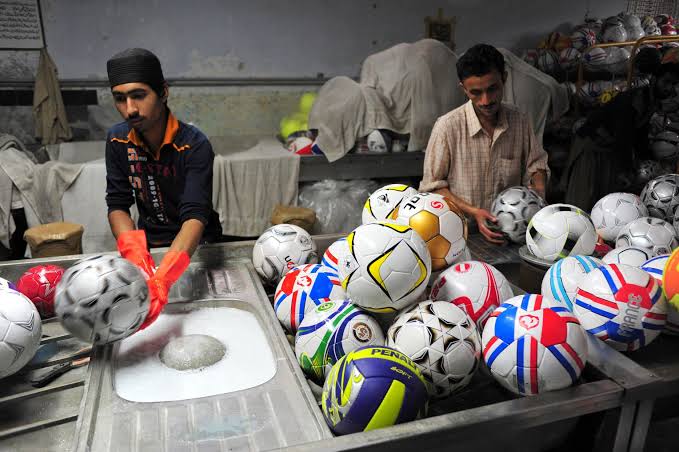Bola Gema Pakistan is located in Sialkot, a city which manufactures most of the world’s footballs, nearly 70% of them. And even a sport’s team has come to a standstill during the pandemic, but the manufacturers continued their business.This factory manufactures about 160,000 footballs per month.
Waseem Shahbaz Lohi, the managing director said “The industry has been around for nearly a century, and that’s why our perfection of skills is amazing”. Who was working alone for about 13 years.
The steps involved in the manufacturing are explained below:
It all starts with a machine which prepares sheets out of hot rubber.Then they cut into round shapes which outlines the bladder or the inner lining of the football
These bladders are inflated and backed for a few minutes for the purpose of hardening the rubber.
In the other section of the factory, workers cut the patches for the balls to it’s external shapes. Leather was used earlier to make outer surface, but it can soak up in water. So the factories now make use of synthetic material. Each ball is made up of 20 hexagons and 12 pentagons, all are out together in different ways.
The training and lower end balls are made by machine stitching and the higher end balls are made by a thermo-bonding mechanism. No stiches are put, whole is moulded using advanced technology.
Other speciality is that a lady named Saeeda works on thermo-bonding balls which is like putting puzzles together using a special glue. After which, the ball is allowed to steam which weight should be between 420 to 440 grams it can be welled to $100 dollars in US(FIFA approved ball)more than monthly wages of some workers who make those balls.
This is a 100% export oriented company and they sell their football all over the world who manufactures top, pro-quality balls. They are mostly exported and sent to Germany, Spain, Holland and Belgium.
Over last World Cup 2018, Pakistan exported over 37 million footballs across the globe.Till today, the industry remains the major source of income of atleast 1000 factories in Sialkot employed 60,000 people. But during pandemic, many were shed down.
Before exporting the ball to its assigned destination, it undergoes the last step. They make 2,000 trial runs each ball to see whether the stiches don’t break. Then the balls are packed and shipped to their destination as aided.

